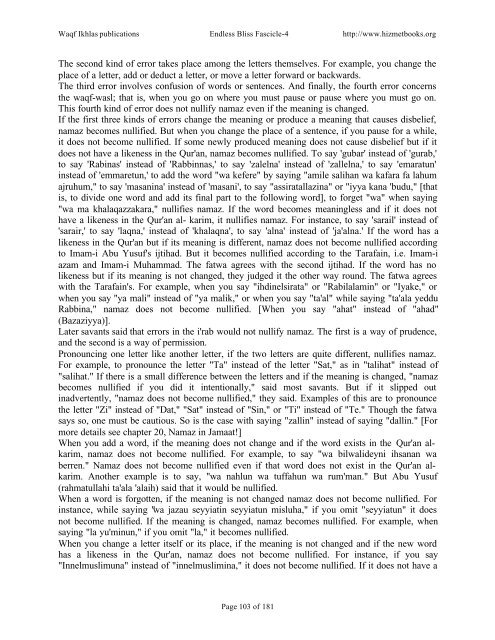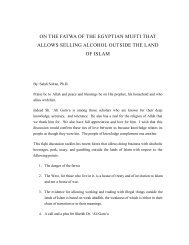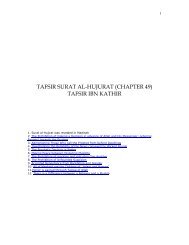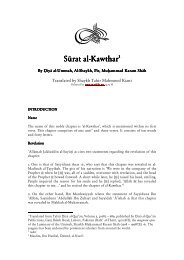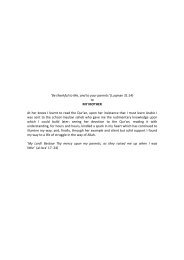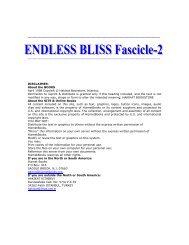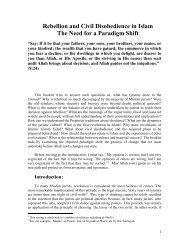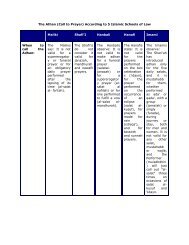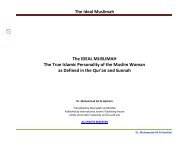ENDLESS BLISS FASCICLE-4
ENDLESS BLISS FASCICLE-4
ENDLESS BLISS FASCICLE-4
You also want an ePaper? Increase the reach of your titles
YUMPU automatically turns print PDFs into web optimized ePapers that Google loves.
Waqf Ikhlas publications Endless Bliss Fascicle-4 http://www.hizmetbooks.org<br />
The second kind of error takes place among the letters themselves. For example, you change the<br />
place of a letter, add or deduct a letter, or move a letter forward or backwards.<br />
The third error involves confusion of words or sentences. And finally, the fourth error concerns<br />
the waqf-wasl; that is, when you go on where you must pause or pause where you must go on.<br />
This fourth kind of error does not nullify namaz even if the meaning is changed.<br />
If the first three kinds of errors change the meaning or produce a meaning that causes disbelief,<br />
namaz becomes nullified. But when you change the place of a sentence, if you pause for a while,<br />
it does not become nullified. If some newly produced meaning does not cause disbelief but if it<br />
does not have a likeness in the Qur'an, namaz becomes nullified. To say 'gubar' instead of 'gurab,'<br />
to say 'Rabinas' instead of 'Rabbinnas,' to say 'zalelna' instead of 'zallelna,' to say 'emaratun'<br />
instead of 'emmaretun,' to add the word "wa kefere" by saying "amile salihan wa kafara fa lahum<br />
ajruhum," to say 'masanina' instead of 'masani', to say "assiratallazina" or "iyya kana 'budu," [that<br />
is, to divide one word and add its final part to the following word], to forget "wa" when saying<br />
"wa ma khalaqazzakara," nullifies namaz. If the word becomes meaningless and if it does not<br />
have a likeness in the Qur'an al- karim, it nullifies namaz. For instance, to say 'sarail' instead of<br />
'sarair,' to say 'laqna,' instead of 'khalaqna', to say 'alna' instead of 'ja'alna.' If the word has a<br />
likeness in the Qur'an but if its meaning is different, namaz does not become nullified according<br />
to Imam-i Abu Yusuf's ijtihad. But it becomes nullified according to the Tarafain, i.e. Imam-i<br />
azam and Imam-i Muhammad. The fatwa agrees with the second ijtihad. If the word has no<br />
likeness but if its meaning is not changed, they judged it the other way round. The fatwa agrees<br />
with the Tarafain's. For example, when you say "ihdinelsirata" or "Rabilalamin" or "Iyake," or<br />
when you say "ya mali" instead of "ya malik," or when you say "ta'al" while saying "ta'ala yeddu<br />
Rabbina," namaz does not become nullified. [When you say "ahat" instead of "ahad"<br />
(Bazaziyya)].<br />
Later savants said that errors in the i'rab would not nullify namaz. The first is a way of prudence,<br />
and the second is a way of permission.<br />
Pronouncing one letter like another letter, if the two letters are quite different, nullifies namaz.<br />
For example, to pronounce the letter "Ta" instead of the letter "Sat," as in "talihat" instead of<br />
"salihat." If there is a small difference between the letters and if the meaning is changed, "namaz<br />
becomes nullified if you did it intentionally," said most savants. But if it slipped out<br />
inadvertently, "namaz does not become nullified," they said. Examples of this are to pronounce<br />
the letter "Zi" instead of "Dat," "Sat" instead of "Sin," or "Ti" instead of "Te." Though the fatwa<br />
says so, one must be cautious. So is the case with saying "zallin" instead of saying "dallin." [For<br />
more details see chapter 20, Namaz in Jamaat!]<br />
When you add a word, if the meaning does not change and if the word exists in the Qur'an alkarim,<br />
namaz does not become nullified. For example, to say "wa bilwalideyni ihsanan wa<br />
berren." Namaz does not become nullified even if that word does not exist in the Qur'an alkarim.<br />
Another example is to say, "wa nahlun wa tuffahun wa rum'man." But Abu Yusuf<br />
(rahmatullahi ta'ala 'alaih) said that it would be nullified.<br />
When a word is forgotten, if the meaning is not changed namaz does not become nullified. For<br />
instance, while saying "wa jazau seyyiatin seyyiatun misluha," if you omit "seyyiatun" it does<br />
not become nullified. If the meaning is changed, namaz becomes nullified. For example, when<br />
saying "la yu'minun," if you omit "la," it becomes nullified.<br />
When you change a letter itself or its place, if the meaning is not changed and if the new word<br />
has a likeness in the Qur'an, namaz does not become nullified. For instance, if you say<br />
"Innelmuslimuna" instead of "innelmuslimina," it does not become nullified. If it does not have a<br />
Page 103 of 181


